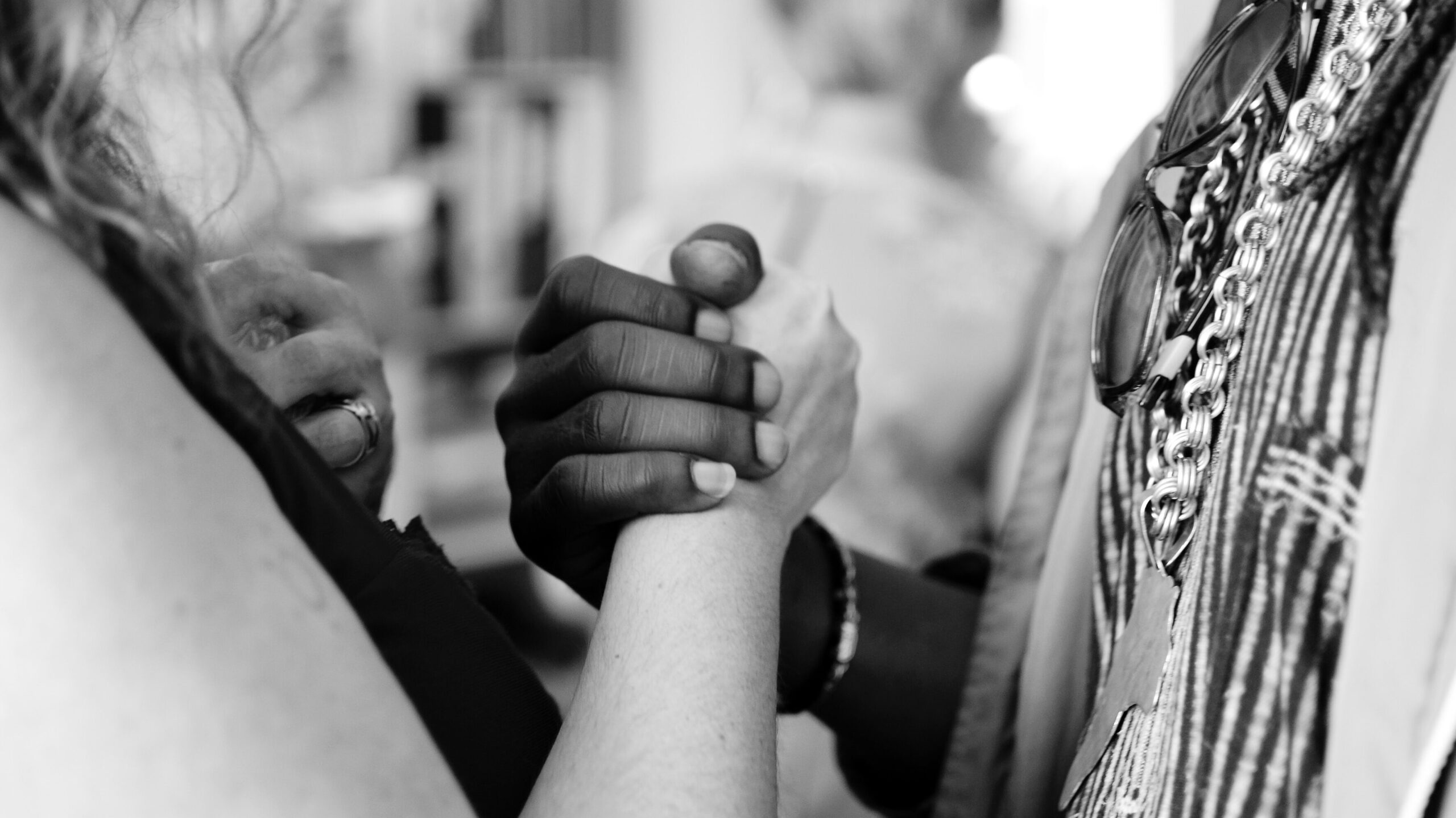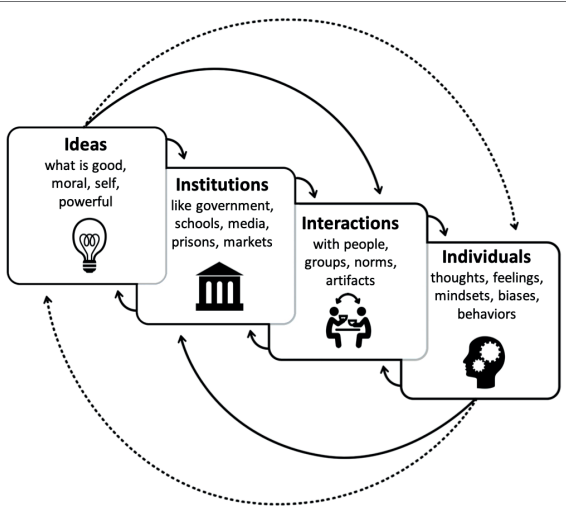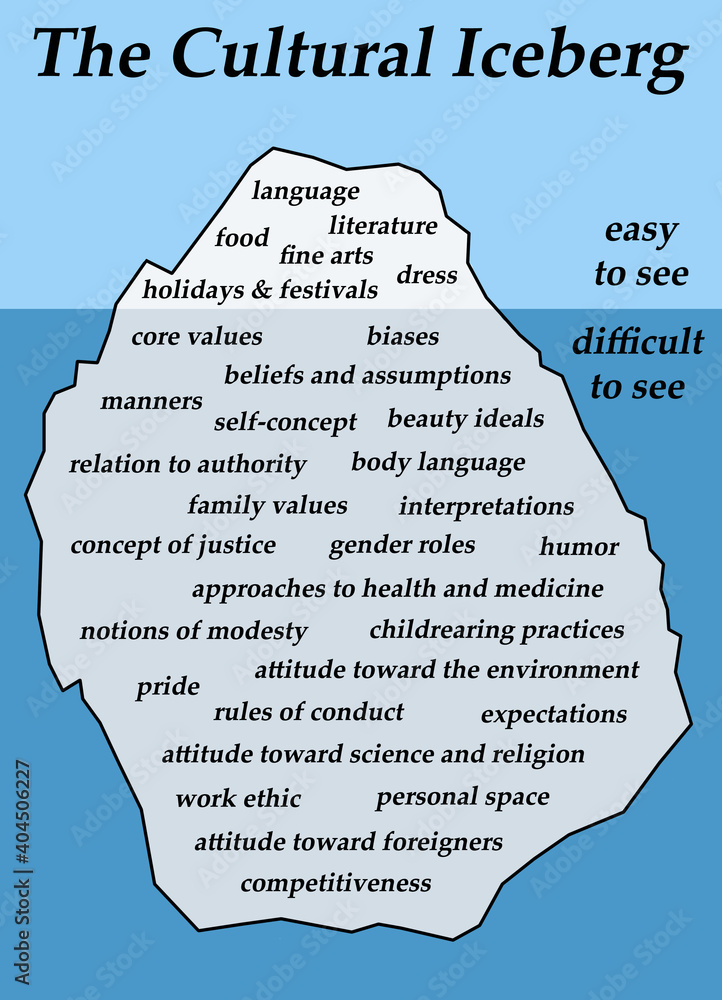
Understanding cultural differences and expanding our awareness of other cultures is proven to help strengthen relationships and reduce conflict.
Culture is defined as a set of shared meanings on the way people see and do things, including a set of practices, traditions, customs, rituals, beliefs, values and rules for life.
When people are faced with cultural differences, it can cause conflict and disagreement rooted in unconscious bias where we are preferential to people who are more similar to us.
It can lead to discrimination or racism, as well as a sense of “in-group” and “out- group” or “us versus them” mentality. It can also lead to social isolation and segregation where people start feeling marginalized and different in the society they live in. It can lead to targeted hateful acts and violence. On a societal level, it can also lead to war.
The Culture Cycle: How Culture is Shaped

Hamedani & Markus (2019)
Culture is based on the ideas, institutions, and interactions that guide and reflect a person’s thoughts, feelings, and actions. People’s thoughts, feelings, and actions are shaped by the interactions we have with people and the cultural artifacts in their daily lives. A cultural artifact are the symbols and objects that are created as a result of culture. For example, the type of utensils used to eat food will vary from country to country.
How we interact with those artifacts and the people also shape the customs and rituals that are developed. On a macro perspective we can see that the government laws, policies, educational systems, and the media are all influenced by the interactions that individuals have and the cultural artifacts, norms, and practices that come from that.
Why Culture is King:
Culture can shape the beliefs and values about what is right, good, and natural.
Oftentimes these ideas are unseen. These are developed through history and become ingrained in a culture. How individuals interact with these deeply-held ideas will influence their interactions with others on a personal level. These interactions will also shape societal and cultural norms, which then goes on to influence on a macro level social policies and laws enacted by the government. In other words, culture is king.
Visible and invisible culture:

There are visible aspects of culture, as well as the invisible aspects of culture.
Some visible aspects include languages, food, music, clothing, and ceremonies. These are things that we see and often form ideas, biases, and judgments about. However, this is only the tip of the iceberg.
Invisible aspects include the values, beliefs, unspoken taboos, and behaviors that one learns only after growing up or spending a significant amount of time within that culture.
Often a mistake we make is that we form general assumptions and treat others simply based on what we see from just the tip of the iceberg. We need to make a better effort to understand the deeper, invisible aspects of culture to increase intercultural understanding and minimize stereotyping and misunderstandings.
How to develop intercultural awareness:
How can we develop intercultural awareness so that we can minimize conflict and strengthen relationships with those different from us? There are some recommended strategies:
Admit that you don’t know everything:
Not knowing everything about another person’s culture is completely okay. Acknowledging your ignorance is the first step towards learning about different cultures and opening up new worlds.
Increase knowledge of your own culture:
Try and understand the characteristics that define your own culture. Ask yourself: what are your country’s general attitudes towards important topics such as gender roles, familial expectations, child rearing practices? What is the working culture in your own country like? What is your country’s attitude towards modesty? What aspects of your own culture do you like and dislike?
Take an interest and start asking questions:
Try to get a better understanding of other countries and their cultures and begin to note both similarities and differences. If you know others who come from another culture, ask them neutral questions about their culture to get more information.
Don’t make judgments and have empathy:
When you take an interest and start collecting information about another culture, avoid making judgments about the culture. Try to find connections and similarities as well as have an empathetic approach and try to see yourself in the other person’s shoes living in that culture.
Systematically review your assumptions:
Are the beliefs you hold stereotypes? Are they true or untrue? Try to ask colleagues and friends who are from that culture or know more about that culture if you need clarification.
In the beginning of this post, we talked about how cultural differences can lead to conflict. However, on the flip side, celebrating the cultural differences and seeking to strengthen awareness can lead to many positive changes and aspects to your relationships. These benefits include the opportunity to celebrate new traditions, more diverse and innovative teams, healthier and more inclusive workplaces, greater understanding of the world, and development of empathy.
Cultural differences through the gospel lens:
Cultural differences can be a catalyst for dynamic growth in relationships that further the Kingdom of God. Satan has used cultural differences throughout the ages to bring about racism, war, violence, which all hurt the body of Christ.
Instead, God has used cultural differences to teach us the mystery of gospel and raise disciples in all nations.
God’s original intention for humankind’s creation was to enjoy a relationship with Him. However, after the fall of man in the Garden of Eden, our identity as humans is now twisted and the image of God inside of us has been distorted. Our priority for living is no longer God. Instead, we are focused on ourselves and our “in group” whether that be our families, or our chosen communities.
The Biblical start of different cultures can be traced back to Genesis 11. At the Tower of Babel, God confused the language of Babylonians and scattered the people to disparate parts of the Earth. Even today in this present moment in time, it is impossible to understand deeply every culture and language.
However, through Christ our identity can be completely changed. We find our sense of self when we commit ourselves to God. We still have our body, our experiences, and our scars, but in Christ, we have a new purpose. We are no longer living for ourselves, our families or our chosen communities, but for the glory of God.
So how can cultural differences be a way to honor God?
First, through conflict and pain, which is inevitable in our current times, we see the reality of our fallen state. The conflicts allow us to see our need for God’s benevolence. It is important to see the cultural underpinning of our conflicts but to always see the spiritual aspect as well. There can be no true peace and reconciliation without coming back to a relationship with God first. Therefore, Christ is our true mediator with God, and also the mediator with human relationships.
Secondly, when we are genuinely hurt by cultural conflict, we are forced to stand before God again: not as victims as other people’s insensitivity or attacks, but as recipients of God’s love, acceptance, and forgiveness. He has forgiven all our sins and transgressions. Perhaps God is pushing us to enter more deeply into the mystery of the Gospel which gives us the power to forgive and transcend cultural boundaries. Instead of feeling embittered, try to understand the deeper motives and practice compassion instead of resentment and hatred. Our personal experiences can help us be more empathetic and understanding for those undergoing similar conflicts.
Enjoyed our blogpost? Subscribe to our newsletter for more resources on mental health and integrating the Gospel message in your healing journey.
If you found our resources useful, please consider donating to Oak Health Foundation, which is a 501(3)c nonprofit dedicated to providing resources regarding holistic mental healthcare and subsidized treatment for those in need.




